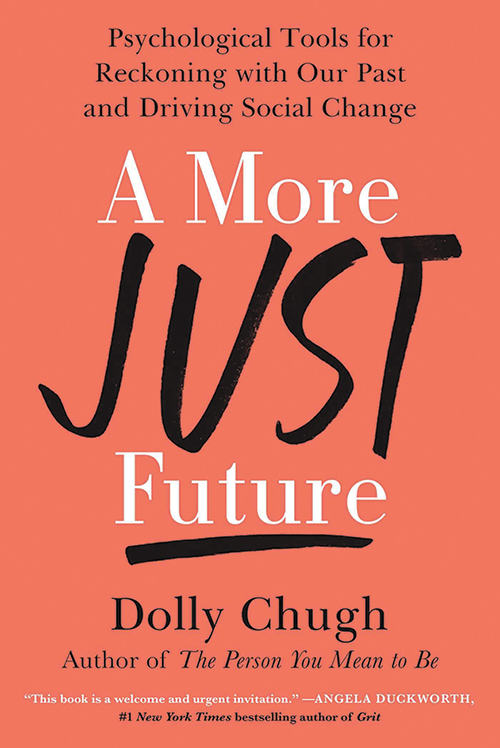
A More Just Future: Psychological Tools for Reckoning with Our Past and Driving Social Change
Reviewed by Patience A. Schenck
September 1, 2023
By Dolly Chugh. Atria Books, 2022. 224 pages. $28.99/hardcover; $14.99/eBook.
When I first experienced a call to educate White people about racism, I was surprised to notice how embarrassed I felt in bringing it up with people. And I was immediately struck and confused by the defensiveness I encountered in others. People had two reactions: they would diminish or deny my concerns (or change the subject), or they would try to demonstrate to me how non-racist they were. They seldom showed curiosity about what I was learning and teaching. Clearly, this was a subject that elicited some feelings.
Today, many people are more open to learning about racism, but discomfort is still there. People (including myself) still fear making racially insensitive comments. Politically, the backlash against the teaching of honest history in our schools is widespread.
Why all this emotion and denial? This is the focus of Dolly Chugh’s book. A social psychologist and immigrant from India, Chugh deeply loves her adopted country. And she, too, adopted many blind spots leading to denial.
She describes the enjoyment she and her daughters had reading the Little House on the Prairie books by Laura Ingalls Wilder. It never occurred to her to wonder with her children why the White settlers thought they had a right to Native American land. (I had the same experience with my children. I hardly questioned Ingalls’s depiction of Indians as wild and primitive.)
Chugh describes a number of reasons people react emotionally to learning about injustice. Here are a few.
We see what we want to see. This is called “confirmation bias.” Social psychologists have shown, for example, that fans of a winning team remember a game differently from fans of the losing team. The same is true for learning about oppression. It makes an enormous difference whether your people were victims or perpetrators.
Hearing negative facts about the past brings up uncomfortable feelings of guilt, shame, and anger.
Knowing one’s history can lead to a sense of stability. In times of social change, people may increase their patriotic identity in order to regain that stability. They may fear for the future of their group. Opposition to immigration is one result.
Many people don’t understand what history is: stories of the past, always selected and told from a particular point of view. But a lot of things happened in the past, as documented by official papers, letters, newspaper articles, and many other sources. What is chosen to be recorded as history depends upon who is choosing the facts to include.
So, what do we need to do?
One suggestion is to embrace paradox. Chugh gives the example of Independence Day and Juneteenth. On the Fourth of July, we celebrate the signing of the Declaration of Independence, which proclaimed “that all men [sic] are created equal.” On Juneteenth, we celebrate the end of slavery, which occurred nearly a century after we declared that all men are created equal. We are uncomfortable with cognitive inconsistency. Yet our history is inconsistent. We need to accept this kind of paradox.
We need to connect the dots between the past and the present. We think that slavery and Jim Crow happened a long time ago. In fact, many people who lived under Jim Crow are still alive. Many older Black people once knew elders in their families who had been enslaved. Likewise, White people’s insistence on racial segregation was not so long ago. These ideas live on.
To connect the dots, Chugh has several suggestions. Notice the seduction of nostalgia: the good old days were not always good. Think critically about disparities: if Black people and White people live in different neighborhoods, ask why. Seek different perspectives on the same event: hear the voices not just of the victorious or powerful (who write the history books) but of the powerless. Finally, dig into the backstories: Where did that tradition come from? Why do we celebrate that?
Chugh tells us to reject racial fables. She illustrates this with the example of Rosa Parks, depicted as an elderly Black seamstress living in Montgomery, Ala., who, while riding a bus on her way home from work one day, refused to give up her seat because her feet were tired. We are not told that she was trained in nonviolent resistance or that Black citizens in Montgomery had for years built networks, skills, knowledge, strategy, and courage in preparation for taking advantage of the right opportunity to rebel.
She tells us to recognize that our heroes had flaws; they were human. Know that we tend to think that past winners must have been the good guys; question that. And recognize that our fable of the American dream hasn’t worked for everyone.
Finally, in the last section, Chugh urges us to take responsibility for fixing injustice in our society and to build personal grit in doing the work.
This book addresses an important and often overlooked aspect of our work toward a more just future: the need to deconstruct how we respond to learning about painful realities.
Patience A. Schenck is a member of Annapolis (Md.) Meeting. She lives at Friends House in Sandy Spring, Md.
1 thought on “A More Just Future: Psychological Tools for Reckoning with Our Past and Driving Social Change”
Leave a Reply
Comments on Friendsjournal.org may be used in the Forum of the print magazine and may be edited for length and clarity.



Excellent review
A helpful book for teachers as well as individuals
i will probably buy the book